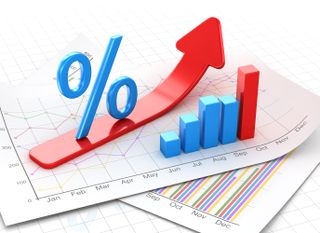Searching for the best mortgage lender can be confusing. Understanding the financial jargon can be even harder. If you are wondering what the difference between an adjustable rate and a fixed rate mortgage is, this article will breakdown the differences between each type of mortgage. It will also discuss the times when these different types of mortgage can be advantageous or disadvantageous.
This guide is designed to get you started, and for the best mortgage advise you should consult an expert who can review your personal circumstances. But it should give you a general idea of what type of mortgage is right for you.
- Best mortgage lenders
- Best refinance mortgage companies
- When to refinance a mortgage
- Transferring mortgages
- Mortgages for bad credit
- Best credit repair companies
- Best home equity loans
- Best reverse Mortgages

Fixed rate mortgages
A fixed mortgage rate is a property loan that has a set monthly repayment fee. The mortgage rate will remain the same throughout the entire term of the loan. The repayments might fluctuate a little due to an increase in homeowners tax, and homeowners insurance but the principal (repayments on the original sum lent) and the interest (the fee place on the sum of money lent) will remain the same.
Fixed-rate mortgages offer a predictable routine payment that enables people to create a clear monthly budget. This is great for people that like to have a stable financial plan for the future or a tight household budget to manage.
Fixed rate mortgages tend to have higher interest rates than other types of mortgages. Generally, the shorter the length of the mortgage, the lower the interest rates will be. This is because there is less risk on the loan, and so the lender can offer better mortgage rates. Typical mortgage terms usually run between 15 years and 30 years, although there are some mortgage lenders that offer shorter or longer terms.
30-year fixed rate mortgage
Over 90% of Americans have a 30-year fixed rate mortgage making it the most popular type of mortgage. These mortgages are best for people who want low, consistent monthly payments. Just be aware that the downside of this lower payment will be greater overall interest cost. This means a greater amount of your monthly will be pay off interest and not principal.
Over 90% of Americans have a 30-year fixes rate mortgage
Based on the current national average of mortgage rates you will be paying $495 per month for every $100,000 borrowed. These rates will vary due to personal credit history, area, and even lender.
20-year fixed rate mortgage
An increasing amount of lenders are moving towards offering shorter terms and 20-year fixed rate mortgages are becoming more popular with borrowers. These generally are the best compromise between low monthly payments and better interest rates. The monthly payments will be higher than a 30-year mortgages but the interest rates and the total amount paid will be lower.
15-year fixed rate mortgage
We only recommend 15-year fixed rate mortgages for people that have a high monthly income, as any mortgage that is 15 years or less will have high monthly repayments. It can also be difficult to maintain the schedule if you plan on having children or have a financial emergency during the 15-year period. This means a higher level of planning might be necessary. Although they have higher monthly payments, they do offer lower amounts of interest. Meaning you will spend less money buying your home.
Based on the national current national average of mortgage rates you will be paying $726 for every $100,000 borrowed. Meaning that the monthly payments are less than double a 30 year rate mortgage. These rates will vary due to personal credit history, area, and even lender.
When you compare the 30 year fixed mortgage rates with the 15 year the overall repayment for a $100,000 loan changes from $178,200 to $130,680 - saving you $47,520 in interest payments.
When should you get a fixed rate mortgage?
Fixed rate mortgages are the better choice for the majority of people. They make it easier to plan for the future when compared to variable rate mortgages. Fixed rate mortgages are best for people that are going to be living in the property for over five-years or when interest rates are at a low and set to raise over the coming years.
With the current low interest rates, a fixed rate mortgage is the more prudent choice for first time buyers that are building a family.

Adjustable rate mortgages (ARMs)
An adjustable rate mortgage is a loan where interest rates vary. How and when they vary depends largely on the type of mortgage and the index rates changes are calculated from. These changes tend to be set by independent market forces that neither party has control over. So, monthly payments can go up and down due to largely unpredictable circumstances, which means these mortgages can wreak havoc with financial plans and budgets.
The rate of adjustable rate mortgages are not only set by the index but by a margin percent set by the lender. The margin percent will always be fixed, whereas the index will vary. For example, in the first year an index rate of 1.5% will be added to the mortgage lenders rate of 4% to give a rate of 5.5%. If the index shifts the following year to give a new rate of 1.75%, this will be added to the lenders interest rate to produce an overall rate of 5.75%. The index rate can decrease as well as increase.
The three major indexes to look out for are :- Lobir, COFI and weekly constant maturity yield on one-year Treasury bill.
Variable rate mortgages
Variable rate mortgages are just another name for adjustable rate mortgages. These tend to vary from year to year and have no fixed rate period. Rates will vary on a set period set out in the mortgage agreement and will be based off the margin percentage and the index rate.
Hybrid adjustable rate mortgages
These are adjustable rate mortgages that begin with a fixed rate period. The fixed period does vary in years. The most popular hybrids are usually 5/1 adjustable mortgages. This is a five year fixed period, followed by an adjustable rate for every year afterwards. Generally, the first number always represents the fixed period and the second number is the interval which rates are adjusted after the fixed period ends.
Lenders offer 3/1, 5/1, 7/1 and 10/1 periods on these types of mortgages.
As the initial fixed rate interest in hybrid adjustable rate mortgages is usually a lot lower than fixed rate mortgage interest, these are usually the best options in you are planning on moving or selling to property within five years.
Option mortgages
This adjustable rate mortgages gives the borrower a number of options in how they want to pay back the mortgage. These options comprise of a set minimum repayment period, interest only payments, paying off the loan gradually over a 15 year period, or paying off the loan over a 30 year period.
When should you get an adjustable mortgage period?
We’d only really recommend an adjustable rate mortgage when you are only going to be living in the property for a short period before selling it. It is also a good option if interest rates are extremely high, and are going to decrease.
Some people might be tempted to opt for a variable rate due to the initial lower interest rates and repayments. These initial lower rates will allow you to afford a house in a better neighborhood, near to an excellent school district but we’d caution against that. Keep in mind that these interest rates could double due to changes in the index system.
If you are looking at a variable rate mortgage, we’d caution you to only consider one if you earnings are expected to increase during the following years. This can help you absorb any rate increases.
Interest only mortgages
Interest only mortgages are property loans where you only pay the interest on the loan during the initial stages of the mortgage. This offers a low monthly period, but after a certain period you will have to pay back the principal at a higher rate, which means it will end up costing more monthly than a fixed-rate mortgage. This interest only term lasts for 10 years on average. In the long-term interest only mortgages are expensive.
When should you get an interest only mortgage?
Interest only mortgages are generally not suitable for first time-buyers who are looking for a long-term home. They are usually only used as a temporary means of owning a home as an alternative to renting. An example of this is a retired couple having an interest only mortgage on a second vacation home as they wait for their first home to sell.
This type of mortgage is for people who are in a strong position financially or have the discipline to save money to pay off the principal or invest their money in other ways that will offer a greater return. It is also a great option for people whose monthly income changes from month to month.

Balloon mortgages
Balloon mortgages tend to have extremely short terms, usually around ten years. They do offer low monthly payments, or interest only repayment options. Once the term is over you will be expected to pay the outstanding amount in one payment. This can be a great burden on the borrower, especially if the property they have the mortgage on has lost value or can’t be sold to settle the debt.
When should you get a balloon mortgage?
In theory, balloon mortgages are great for initial purchases due to the low interest rates. This low interest rate should allow you to pay off a greater amount of the property, resulting in a lower, more manageable mortgage when you refinance before the term expires.
In reality, there are numerous risks with this strategy. Interest rates could raise significantly, increasing the cost of the monthly repayments when you do refinance. Over the course of the balloon mortgage your credit could get worse or you may be on a lower income, which might mean you no longer qualify for a mortgage. This could make refinancing difficult. Property values could also lower. If the property loses value very fewer mortgage lenders will refinance the property due to the risk.
Due to the many risks, we don’t recommend this strategy.
Balloon mortgages will also let you qualify for a larger loan amount. The high loan limits mean they are better for high value properties you might not otherwise qualify for. We’d only really recommend using balloon mortgages for properties that are only going to own for a short time.
Combination mortgages
Combination mortgages or piggy-back mortgages are when you have two loans from different lenders on a single property. The majority of combination loans consist of an 80% variable rate mortgage, a 10% fixed rate mortgage and a 10% down payment, which allows the borrower to avoid private mortgage insurance.
When should you get a combination mortgage?
Typically people opt for a combination mortgage when they are trying to avoid private mortgage insurance, want to avoid the strict structure in place for jumbo loans on properties with a high value or are buying a second house as they wait for the first to sell.
If you are using a combination loan to avoid paying private mortgage insurance, the best option money-wise is usually to wait until you can afford the down payment without two loans or paying private mortgage insurance.
Jumbo mortgages
When the cost of a house exceeds $484,350, you’ll most probably need a jumbo loan - although this does vary in a few counties. A jumbo loan allows you to borrow more than the conforming loan limits created by Frannie Mae and Freddie Mac. As these loans are not protected by the government when a borrower defaults on their mortgage, the lender undertakes a greater risk.
They are available in a variety of adjustable rates, fixed-rate and for various terms. To qualify for this type of loan you have to meet extra requirements - such as an extremely good credit score of 700+, a debt to income ratio of 45%, cash reserves, and even financial documents such as tax returns and bank statements.
Government protected mortgages
Government loans exist to encourage home-ownership among people who have a low income. These loans are a great option for first time buyers who don’t earn a lot of money. They are also a good mortgage option for people with bad credit. If you do default on the loan, the loss to the lender will be covered by the government.
FHA Loan
An FHA loan is one insured by the Federal Housing Administration. It has lower credit and down payment requirements than a standard mortgage, making it a good option for first-time home-buyers. FHA loans tend to have lower interest rates than other subprime loans and may have lower closing costs.
A standard mortgage requires a credit score of 620 or higher. FHA mortgages are an option worth exploring if you have a score lower than that. You can get an FHA mortgage with only a 3.5% down payment, though a credit score less than 580 requires up to 10%.
All FHA mortgages require private mortgage insurance. With a conventional mortgage, you don’t pay for mortgage insurance if you make a down payment of 20% or more. Mortgage insurance on an FHA loan tends to be less expensive than on a conventional mortgage.
Another advantage of FHA mortgages is they are far more generous with how gifts can be used for down payments. With a standard mortgage, only 20% of the down payment can come from a gift, whereas with an FHA mortgage, all the down payment can be a gift. The lender looks at your income and debt-to-income ratio before making a lending decision.
VA Loan
A V.A loan is a low payment loan for people that are members of the military if you meet the required guidelines. Most of these loans are provided through a private mortgage company and offer many benefits like zero down payments, no mortgage insurance payments
When should you get a government backed mortgage?
You should check if you qualify for a government backed mortgage if you are on a low income, and have bad credit that might affect you qualifying for a property loan.



